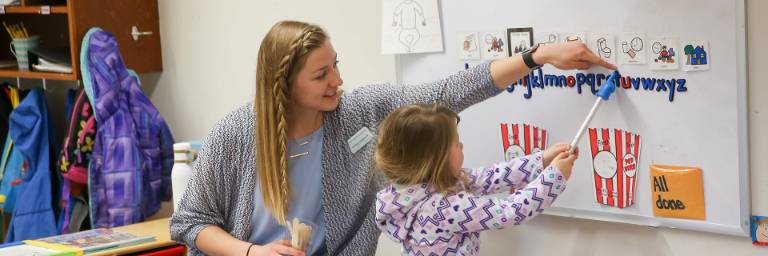Online Early Childhood Education Degree
Get your degree at one of the nation's best online Early Childhood Education programs. 100% of our graduates are employed or pursuing graduate degrees.
The Early Childhood Education classes, field experiences and student teaching at UND will transform you. You'll become an observer, learner and independent decision-maker with an effective teaching style for children.
- Program type:
- Major
- Format:
- Online
- Est. time to complete:
- 4 years
- Credit hours:
- 125-128
Why choose UND’s online Early Childhood Education degree?
Affordable and 100% Online Bachelor's Degree in Early Childhood Education
-
Enroll in early childhood education courses prior to admission to the program.
-
Have direct involvement with children in more than 60% of your courses.
-
Join the Future Educators of UND student organization (FEUND).
-
Learn in a flexible environment. Early childhood education coursework is offered online to support students working in the field.
-
Enjoy small class sizes. All classes are capped at 25 students, meaning you'll receive individual attention.
-
Be a part of Graduate Research Achievement Day or the College of Education & Human Development Research Conference.
Career Opportunities with a Bachelor's Degree in Early Childhood Education
Courses You’ll Take
-
One of the Best Online Early Childhood Education Bachelor's Programs
Why UND Online?
FAQs
Yes, there is a constant demand for early childhood education teachers, with approximately 109,000 annual openings projected for kindergarten and elementary school teachers over the decade.
With a degree in Early Childhood Education, you can embark on several rewarding career paths. Opportunities include teaching at the preschool to elementary levels, directing educational programs, developing curriculum or managing childcare centers.
Yes, an Early Childhood Education degree can lead to teacher licensure. However, it's essential to research the specific licensure requirements in the state or country where you intend to teach, as each region may have its own set of criteria, examinations and application procedures for teacher licensure.
Absolutely. UND's online Early Childhood Education program is designed to be completed within a four-year timeframe. However, we do have students that take classes on a part-time basis.
Holding an Early Childhood Education degree qualifies you to teach at several foundational grade levels, predominantly including preschool, kindergarten and the initial years of elementary school.
While both degrees involve teaching young learners, Early Childhood Education specifically emphasizes the developmental needs of children from birth to age eight. Elementary Education has a broader focus, covering a wider age range, typically up to grade six.
Yes, an early Early Childhood Education degree includes hands-on experiences in classroom settings or the field, allowing students to apply field-tested practices and engage in evidence-based learning techniques.
Yes, UND's Early Childhood Education degree is entirely online, allowing students to complete the program without the need to come to campus. However, students must complete a variety of field experiences where they live as well as a required ten weeks of Early Childhood Education student teaching.
Holding an Early Childhood Education degree qualifies you to teach at several foundational grade levels, predominantly including preschool, kindergarten and the initial years of elementary school.
A Day in the Life
Spend a day in the life of Madison as she pursues her degree through UND's online Early Childhood Education program.
